Gautier Izacard
LLaMA: Open and Efficient Foundation Language Models
Feb 27, 2023



Abstract:We introduce LLaMA, a collection of foundation language models ranging from 7B to 65B parameters. We train our models on trillions of tokens, and show that it is possible to train state-of-the-art models using publicly available datasets exclusively, without resorting to proprietary and inaccessible datasets. In particular, LLaMA-13B outperforms GPT-3 (175B) on most benchmarks, and LLaMA-65B is competitive with the best models, Chinchilla-70B and PaLM-540B. We release all our models to the research community.
Task-aware Retrieval with Instructions
Nov 16, 2022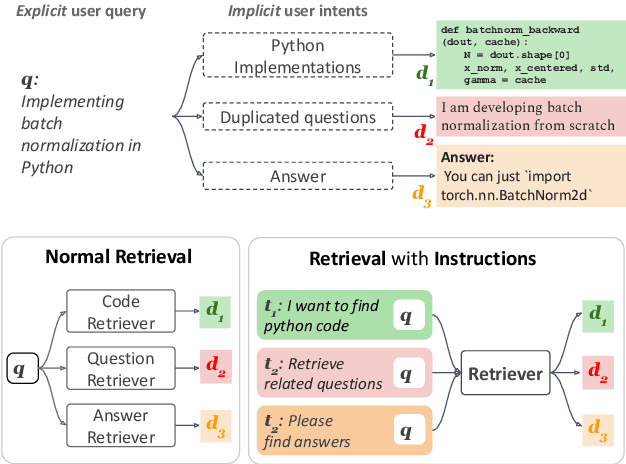



Abstract:We study the problem of retrieval with instructions, where users of a retrieval system explicitly describe their intent along with their queries, making the system task-aware. We aim to develop a general-purpose task-aware retrieval systems using multi-task instruction tuning that can follow human-written instructions to find the best documents for a given query. To this end, we introduce the first large-scale collection of approximately 40 retrieval datasets with instructions, and present TART, a multi-task retrieval system trained on the diverse retrieval tasks with instructions. TART shows strong capabilities to adapt to a new task via instructions and advances the state of the art on two zero-shot retrieval benchmarks, BEIR and LOTTE, outperforming models up to three times larger. We further introduce a new evaluation setup to better reflect real-world scenarios, pooling diverse documents and tasks. In this setup, TART significantly outperforms competitive baselines, further demonstrating the effectiveness of guiding retrieval with instructions.
EditEval: An Instruction-Based Benchmark for Text Improvements
Sep 27, 2022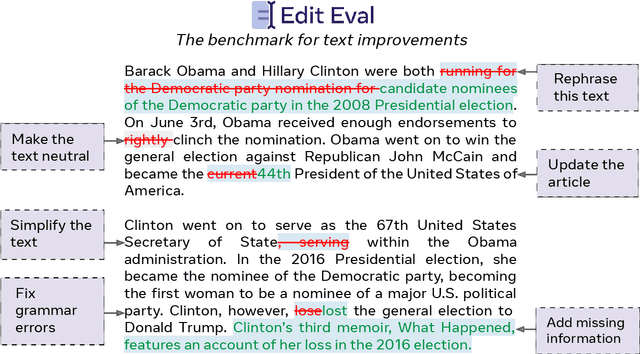
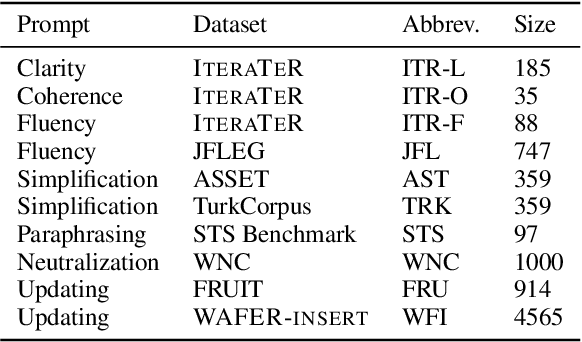
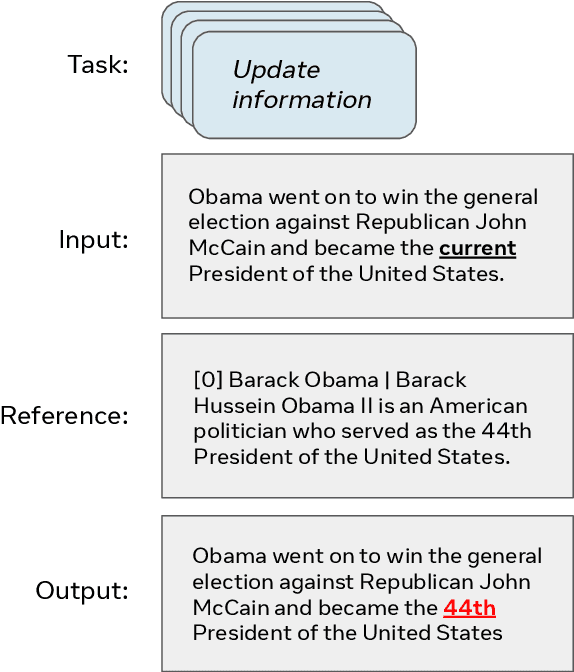
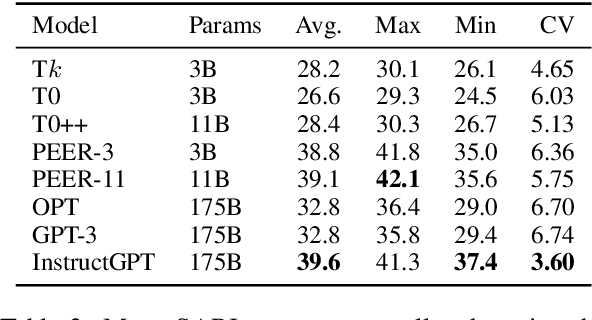
Abstract:Evaluation of text generation to date has primarily focused on content created sequentially, rather than improvements on a piece of text. Writing, however, is naturally an iterative and incremental process that requires expertise in different modular skills such as fixing outdated information or making the style more consistent. Even so, comprehensive evaluation of a model's capacity to perform these skills and the ability to edit remains sparse. This work presents EditEval: An instruction-based, benchmark and evaluation suite that leverages high-quality existing and new datasets for automatic evaluation of editing capabilities such as making text more cohesive and paraphrasing. We evaluate several pre-trained models, which shows that InstructGPT and PEER perform the best, but that most baselines fall below the supervised SOTA, particularly when neutralizing and updating information. Our analysis also shows that commonly used metrics for editing tasks do not always correlate well, and that optimization for prompts with the highest performance does not necessarily entail the strongest robustness to different models. Through the release of this benchmark and a publicly available leaderboard challenge, we hope to unlock future research in developing models capable of iterative and more controllable editing.
PEER: A Collaborative Language Model
Aug 24, 2022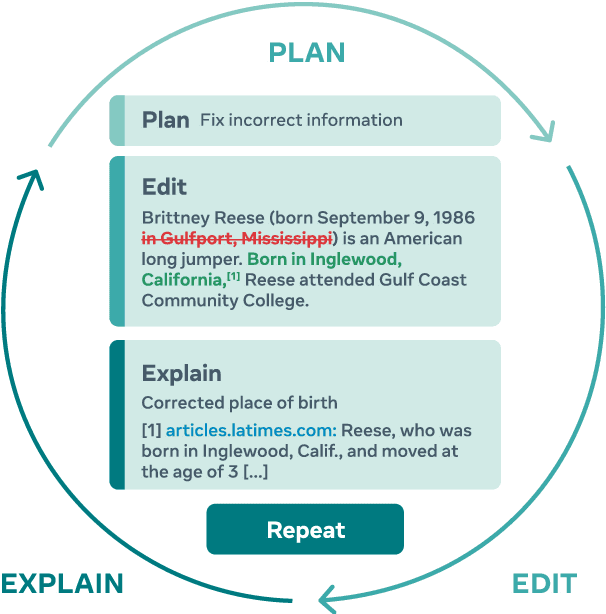
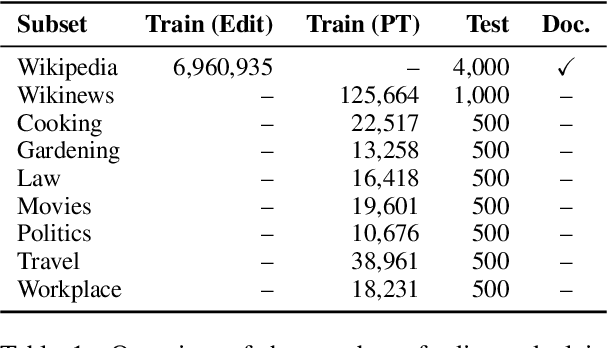
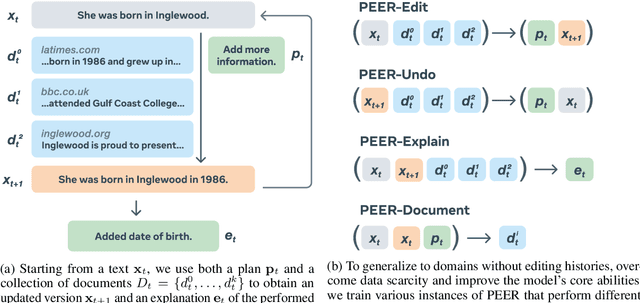
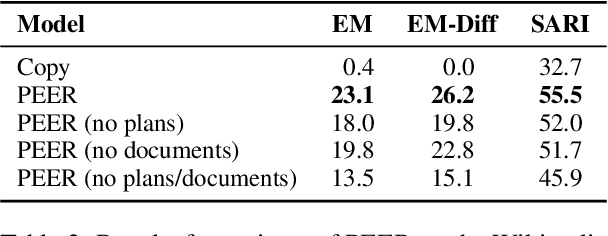
Abstract:Textual content is often the output of a collaborative writing process: We start with an initial draft, ask for suggestions, and repeatedly make changes. Agnostic of this process, today's language models are trained to generate only the final result. As a consequence, they lack several abilities crucial for collaborative writing: They are unable to update existing texts, difficult to control and incapable of verbally planning or explaining their actions. To address these shortcomings, we introduce PEER, a collaborative language model that is trained to imitate the entire writing process itself: PEER can write drafts, add suggestions, propose edits and provide explanations for its actions. Crucially, we train multiple instances of PEER able to infill various parts of the writing process, enabling the use of self-training techniques for increasing the quality, amount and diversity of training data. This unlocks PEER's full potential by making it applicable in domains for which no edit histories are available and improving its ability to follow instructions, to write useful comments, and to explain its actions. We show that PEER achieves strong performance across various domains and editing tasks.
Few-shot Learning with Retrieval Augmented Language Models
Aug 08, 2022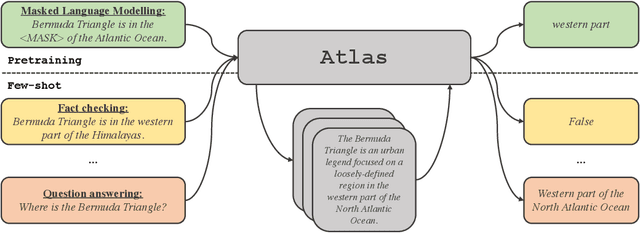



Abstract:Large language models have shown impressive few-shot results on a wide range of tasks. However, when knowledge is key for such results, as is the case for tasks such as question answering and fact checking, massive parameter counts to store knowledge seem to be needed. Retrieval augmented models are known to excel at knowledge intensive tasks without the need for as many parameters, but it is unclear whether they work in few-shot settings. In this work we present Atlas, a carefully designed and pre-trained retrieval augmented language model able to learn knowledge intensive tasks with very few training examples. We perform evaluations on a wide range of tasks, including MMLU, KILT and NaturalQuestions, and study the impact of the content of the document index, showing that it can easily be updated. Notably, Atlas reaches over 42% accuracy on Natural Questions using only 64 examples, outperforming a 540B parameters model by 3% despite having 50x fewer parameters.
Improving Wikipedia Verifiability with AI
Jul 08, 2022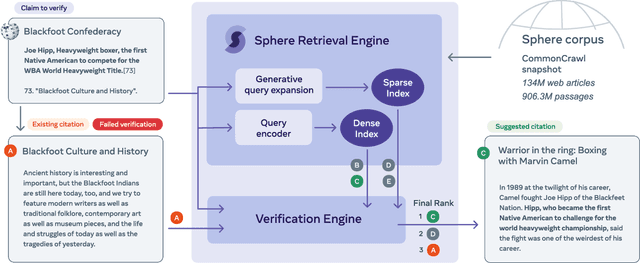

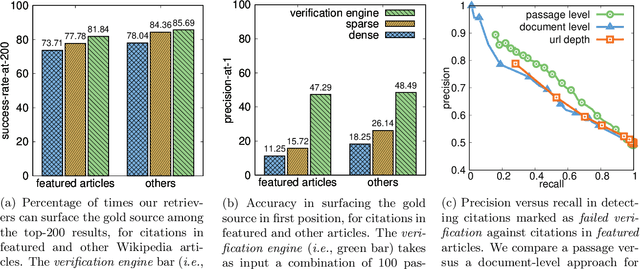
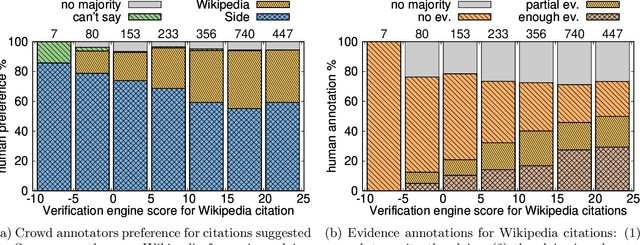
Abstract:Verifiability is a core content policy of Wikipedia: claims that are likely to be challenged need to be backed by citations. There are millions of articles available online and thousands of new articles are released each month. For this reason, finding relevant sources is a difficult task: many claims do not have any references that support them. Furthermore, even existing citations might not support a given claim or become obsolete once the original source is updated or deleted. Hence, maintaining and improving the quality of Wikipedia references is an important challenge and there is a pressing need for better tools to assist humans in this effort. Here, we show that the process of improving references can be tackled with the help of artificial intelligence (AI). We develop a neural network based system, called Side, to identify Wikipedia citations that are unlikely to support their claims, and subsequently recommend better ones from the web. We train this model on existing Wikipedia references, therefore learning from the contributions and combined wisdom of thousands of Wikipedia editors. Using crowd-sourcing, we observe that for the top 10% most likely citations to be tagged as unverifiable by our system, humans prefer our system's suggested alternatives compared to the originally cited reference 70% of the time. To validate the applicability of our system, we built a demo to engage with the English-speaking Wikipedia community and find that Side's first citation recommendation collects over 60% more preferences than existing Wikipedia citations for the same top 10% most likely unverifiable claims according to Side. Our results indicate that an AI-based system could be used, in tandem with humans, to improve the verifiability of Wikipedia. More generally, we hope that our work can be used to assist fact checking efforts and increase the general trustworthiness of information online.
Are Large-scale Datasets Necessary for Self-Supervised Pre-training?
Dec 20, 2021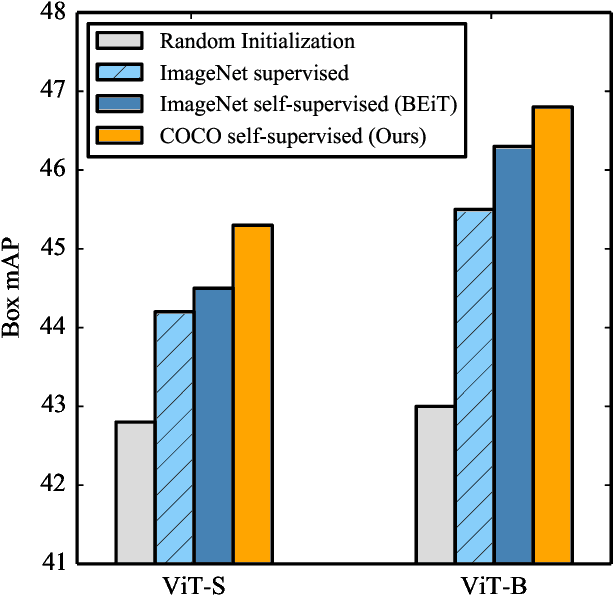
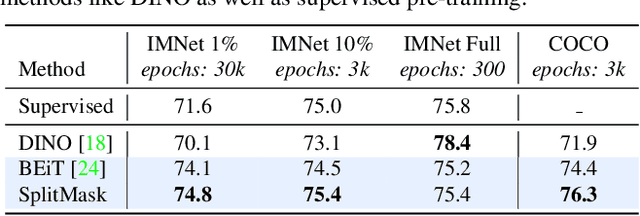
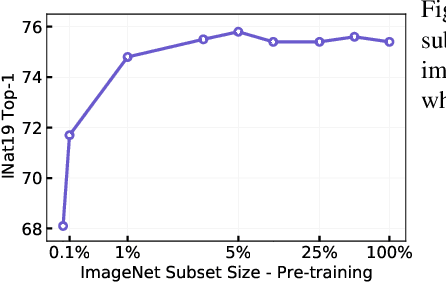

Abstract:Pre-training models on large scale datasets, like ImageNet, is a standard practice in computer vision. This paradigm is especially effective for tasks with small training sets, for which high-capacity models tend to overfit. In this work, we consider a self-supervised pre-training scenario that only leverages the target task data. We consider datasets, like Stanford Cars, Sketch or COCO, which are order(s) of magnitude smaller than Imagenet. Our study shows that denoising autoencoders, such as BEiT or a variant that we introduce in this paper, are more robust to the type and size of the pre-training data than popular self-supervised methods trained by comparing image embeddings.We obtain competitive performance compared to ImageNet pre-training on a variety of classification datasets, from different domains. On COCO, when pre-training solely using COCO images, the detection and instance segmentation performance surpasses the supervised ImageNet pre-training in a comparable setting.
The Web Is Your Oyster -- Knowledge-Intensive NLP against a Very Large Web Corpus
Dec 18, 2021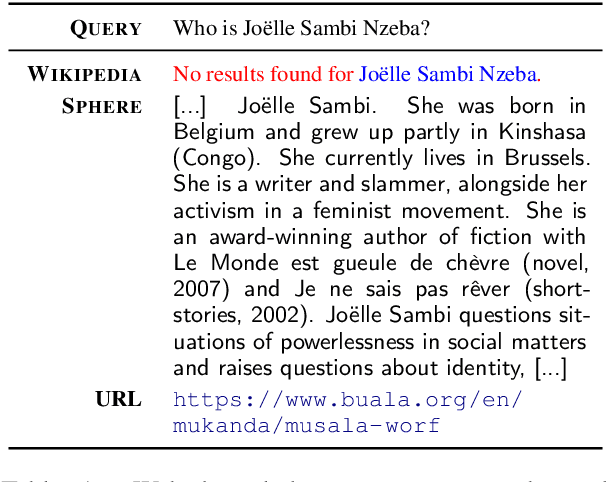
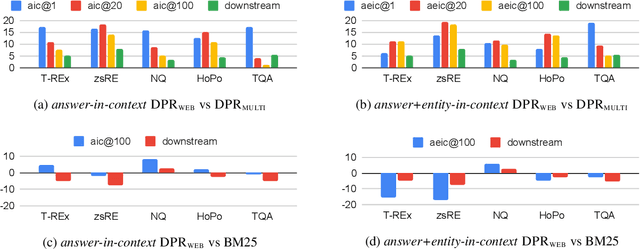


Abstract:In order to address the increasing demands of real-world applications, the research for knowledge-intensive NLP (KI-NLP) should advance by capturing the challenges of a truly open-domain environment: web scale knowledge, lack of structure, inconsistent quality, and noise. To this end, we propose a new setup for evaluating existing KI-NLP tasks in which we generalize the background corpus to a universal web snapshot. We repurpose KILT, a standard KI-NLP benchmark initially developed for Wikipedia, and ask systems to use a subset of CCNet - the Sphere corpus - as a knowledge source. In contrast to Wikipedia, Sphere is orders of magnitude larger and better reflects the full diversity of knowledge on the Internet. We find that despite potential gaps of coverage, challenges of scale, lack of structure and lower quality, retrieval from Sphere enables a state-of-the-art retrieve-and-read system to match and even outperform Wikipedia-based models on several KILT tasks - even if we aggressively filter content that looks like Wikipedia. We also observe that while a single dense passage index over Wikipedia can outperform a sparse BM25 version, on Sphere this is not yet possible. To facilitate further research into this area, and minimise the community's reliance on proprietary black box search engines, we will share our indices, evaluation metrics and infrastructure.
Towards Unsupervised Dense Information Retrieval with Contrastive Learning
Dec 16, 2021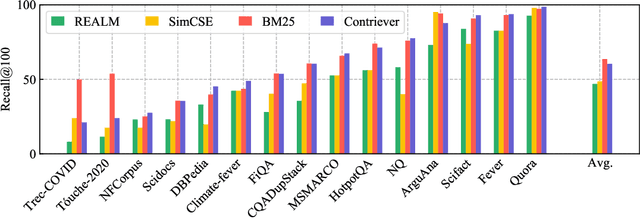

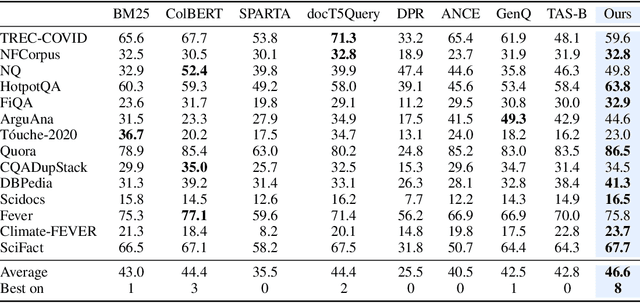
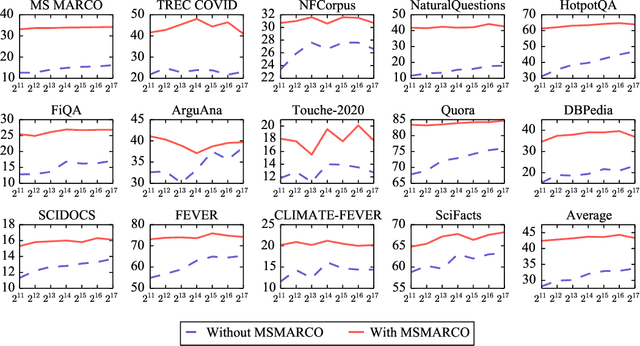
Abstract:Information retrieval is an important component in natural language processing, for knowledge intensive tasks such as question answering and fact checking. Recently, information retrieval has seen the emergence of dense retrievers, based on neural networks, as an alternative to classical sparse methods based on term-frequency. These models have obtained state-of-the-art results on datasets and tasks where large training sets are available. However, they do not transfer well to new domains or applications with no training data, and are often outperformed by term-frequency methods such as BM25 which are not supervised. Thus, a natural question is whether it is possible to train dense retrievers without supervision. In this work, we explore the limits of contrastive learning as a way to train unsupervised dense retrievers, and show that it leads to strong retrieval performance. More precisely, we show on the BEIR benchmark that our model outperforms BM25 on 11 out of 15 datasets. Furthermore, when a few thousands examples are available, we show that fine-tuning our model on these leads to strong improvements compared to BM25. Finally, when used as pre-training before fine-tuning on the MS-MARCO dataset, our technique obtains state-of-the-art results on the BEIR benchmark.
NeurIPS 2020 EfficientQA Competition: Systems, Analyses and Lessons Learned
Jan 01, 2021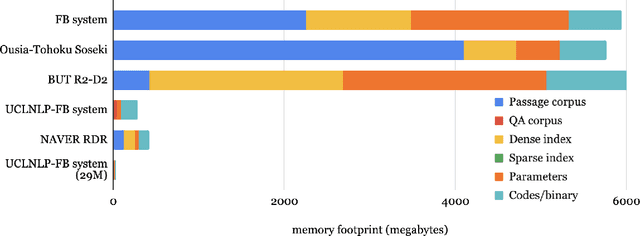
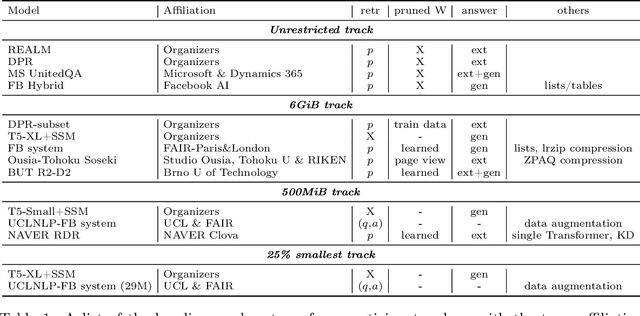
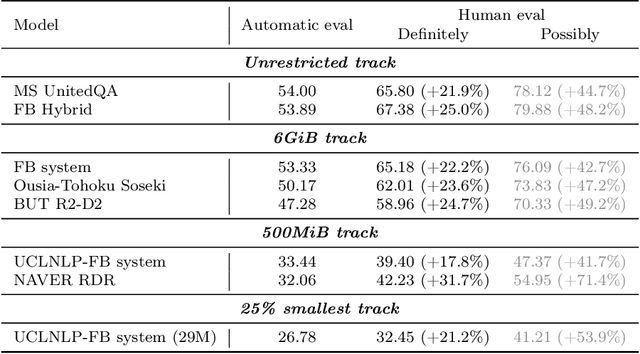
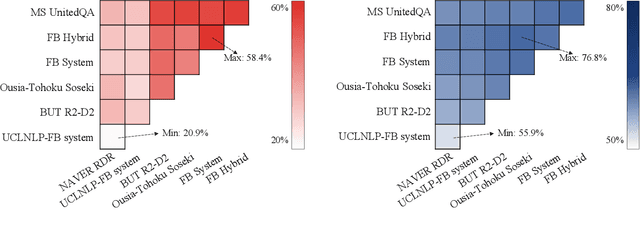
Abstract:We review the EfficientQA competition from NeurIPS 2020. The competition focused on open-domain question answering (QA), where systems take natural language questions as input and return natural language answers. The aim of the competition was to build systems that can predict correct answers while also satisfying strict on-disk memory budgets. These memory budgets were designed to encourage contestants to explore the trade-off between storing large, redundant, retrieval corpora or the parameters of large learned models. In this report, we describe the motivation and organization of the competition, review the best submissions, and analyze system predictions to inform a discussion of evaluation for open-domain QA.
 Add to Chrome
Add to Chrome Add to Firefox
Add to Firefox Add to Edge
Add to Edge